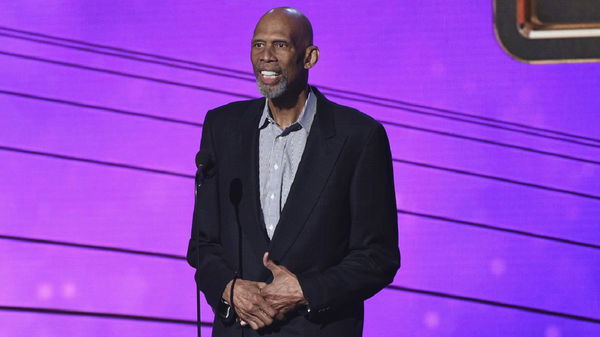

Abdul Jabbar is not new to social justice. In a powerful display of solidarity during the 1968 Olympics in Mexico City, while not participating due to his boycott of the team, Kareem Abdul-Jabbar publicly supported the silent protests of Tommie Smith and John Carlos, who raised their fists in a Black Power salute on the medal stand.
Every now and then, the league reminds us that greatness isn’t just measured in points or rings. When Kareem Abdul-Jabbar said, “I’m honored and grateful to be associated with this award that will recognize the dedicated and selfless people fighting to promote social justice,” he wasn’t just talking about legacy—he was talking about purpose. And that purpose is alive and well.
Advancing Abdul-Jabbar’s lifelong work to engage in the ongoing struggle for equality and social justice, the Kareem Abdul-Jabbar Social Justice Champion Award is an annual award presented by the National Basketball Association (NBA) that recognizes a player for their dedication to pursuing social justice.
ADVERTISEMENT
Article continues below this ad
Earlier this week, the NBA announced the five finalists for the 2024–25 Kareem Abdul-Jabbar Social Justice Champion Award through an official press release. They
are Bam Adebayo (Miami Heat), Harrison Barnes (San Antonio Spurs), Chris Boucher (Toronto Raptors), Jrue Holiday (Boston Celtics), and CJ McCollum (New Orleans Pelicans). The winner will be announced during the NBA Playoffs, with the recipient receiving the Kareem Abdul-Jabbar Trophy and a $100,000 donation to a justice-focused organization of their choice.Kareem himself didn’t hold back in showing love for the finalists. He took to his social media, sharing a heartfelt message:
“Congratulations to these 5 finalists!! You deserve the recognition, and seeing the work you’re putting into your communities makes me proud.” It was a simple, yet powerful shout-out, a moment where the legend made it clear that the award isn’t just about recognition—it’s about real, lasting change.
via Imago
(Original Caption) Photo of Kareem Abdul-Jabbar, Los Angeles Lakers center. Filed, 3/25/1980.
ADVERTISEMENT
Article continues below this ad
Adebayo’s been putting in work off the court through his “Bam, Books, and Brotherhood” foundation, dropping over $50k to support education and youth empowerment. He’s not just building his career, he’s building futures for those who need it most. And McCollum? He’s been tackling education, food insecurity, and more, using both his voice and wallet to push for real change.
Then there’s Boucher, who’s been making noise in Toronto with his work fighting food insecurity and supporting youth programs. Jrue, along with his wife Lauren, has made waves by giving back over $5 million in grants to underrepresented entrepreneurs. Meanwhile, Barnes has been using his “Barnes Family Foundation” to focus on racial justice and economic empowerment, showing that his impact goes way beyond the game.
These guys are proving that leadership in the NBA is about more than what happens on the court. But where did it all start?
Kareem Abdul-Jabbar’s legacy beyond the court
Jabbar’s life is a powerful example of how one person can influence much more than just their field of expertise. As he told Harvard Business Review, “I know I’ll be remembered for the things I did on the basketball court. But I hope people will also see that, with my books and my film, I was multidimensional.” His achievements, both on and off the court, earned him the nation’s highest civilian honor, a reflection of his far-reaching impact in social and political movements beyond the sports world.
Growing up in Harlem, he was deeply influenced by the Harlem Renaissance, a period that gave Black Americans a platform to show their worth. “Harlem was a very important place for black Americans,” he recalled. His resolve for justice grew even stronger after witnessing Muhammad Ali stand against the Vietnam War. In 1971, Jabbar took his own stand by publicly declaring his Muslim faith and changing his name from Lew Alcindor. “Being able to assert an identity that is in harmony with who I am, that was the most important thing,” he said.

via Getty
INGLEWOOD, CALIFORNIA – DECEMBER 03: Former NBA player Kareem Abdul-Jabbar during a game between the Cleveland Browns and the Los Angeles Rams at SoFi Stadium on December 03, 2023 in Inglewood, California. (Photo by Ric Tapia/Getty Images)
Kareem’s commitment to bettering society extended into public health during the COVID-19 pandemic, where he strongly advocated for vaccine mandates, particularly in the Black community. “There is no more research to do when thousands are dying every day,” he pointed out, stressing the urgency of taking action. Whether it’s through his social justice work, public health advocacy, or education, Jabbar has remained steadfast in his mission to make the world a better place.
He might have strong opinions on pretty much everything else, but when it came to picking between Kobe Bryant and LeBron James, even Kareem couldn’t pick a side. He kept it cool and neutral, simply saying, “I’d take either one of them.” Classic Kareem, always the diplomat! No matter what his choice might’ve been, Kareem’s excitement for the new winners of the Social Justice Champion Award speaks volumes. It’s a true reflection of everything he’s worked for—paving the way for others to use their voices for something bigger than just the game. So, while he might not pick a side between Kobe and LeBron, you can bet he’s all in on championing those who make a real impact off the court!
ADVERTISEMENT
Article continues below this ad
ADVERTISEMENT
ADVERTISEMENT
ADVERTISEMENT
ADVERTISEMENT

